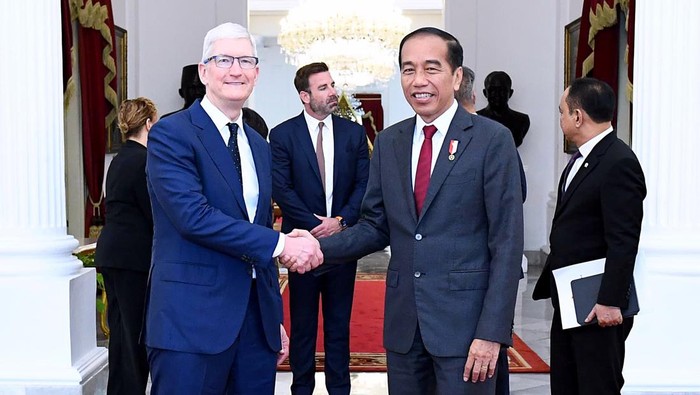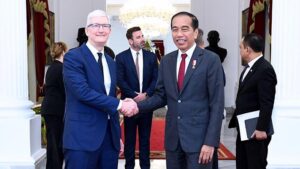

dynastyelectric.net, Jakarta – Excitement is in the air as Indonesian President Joko Widodo, known affectionately as Jokowi, sets his sights on a groundbreaking mission: persuading Apple’s top honcho, Tim Cook, to establish an iPhone factory right here in Indonesia. The potential implications of this endeavor are nothing short of game-changing for both the tech industry and the Indonesian economy. Let’s delve into the details of this ambitious plan and explore whether Jokowi can successfully woo the apple bos himself!
Benefits of having an iPhone factory in Indonesia
Having an iPhone factory in Indonesia would bring numerous benefits to the country’s economy and job market. It would create a significant number of employment opportunities for locals, helping to reduce unemployment rates and improve livelihoods. The influx of jobs will also lead to skill development and knowledge transfer among Indonesian workers.
Additionally, having Apple manufacture iPhones in Indonesia would boost the country’s manufacturing sector and promote technological advancement. This could attract other tech companies to invest in Indonesia as well, further diversifying the economy. Moreover, local suppliers and businesses would benefit from partnerships with Apple, fostering growth within the supply chain ecosystem. Furthermore, having an iPhone factory in Indonesia could potentially increase exports and foreign exchange earnings for the country. This would contribute positively towards GDP growth and enhance Indonesia’s position on the global technology map.
Challenges and concerns in making this deal happen
Securing a deal to bring an iPhone factory to Indonesia is no easy task. One of the major challenges Jokowi faces is convincing Apple’s CEO, Tim Cook, that Indonesia offers a competitive advantage over other manufacturing hubs. Infrastructure and logistics must be up to par to meet Apple’s stringent standards for production efficiency and quality control. Another concern is ensuring a skilled workforce capable of meeting Apple’s rigorous demands in terms of technology and innovation. Training programs may need to be implemented on a large scale to bridge any skill gaps.
Intellectual property rights protection is also crucial in negotiating with a tech giant like Apple. Ensuring that patents and copyrights are respected will be paramount in building trust between the two parties. Moreover, navigating through bureaucratic red tape and regulatory hurdles can slow down the process significantly. Streamlining administrative procedures will be vital in expediting negotiations and getting the project off the ground without unnecessary delays.
Other countries that have successfully attracted Apple’s manufacturing
Countries like China, India, and Vietnam have successfully attracted Apple to set up manufacturing plants within their borders. These nations offer various incentives such as tax breaks, infrastructure support, and a skilled workforce to entice big tech companies like Apple.
China has been a key player in Apple’s supply chain for years, with Foxconn operating multiple factories in the country. India recently launched the PLI scheme to boost local manufacturing of smartphones, attracting investments from major players including Apple. Vietnam’s strategic location and growing economy have made it an attractive destination for electronics manufacturers looking to diversify their production bases. These countries have shown that by creating favorable business environments and addressing logistical challenges, they can effectively lure top tech companies like Apple to establish manufacturing operations on their soil.
Jokowi’s strategy and approach in convincing Tim Cook
Jokowi’s strategy in persuading Apple CEO Tim Cook to establish an iPhone factory in Indonesia involves showcasing the country’s growing tech-savvy population and strategic location in Southeast Asia. By highlighting Indonesia’s potential as a hub for manufacturing, Jokowi aims to attract Apple’s interest and investment.
His approach focuses on emphasizing the benefits of setting up production facilities in Indonesia, such as cost-effectiveness and access to a large consumer market. Jokowi also plans to address any concerns or challenges that may arise during negotiations, demonstrating his commitment to making the deal mutually beneficial.
Through diplomatic channels and economic incentives, Jokowi seeks to build a strong case for why Apple should consider expanding its operations into Indonesia. His proactive stance reflects his determination to boost the country’s economy and create job opportunities for its citizens.
Possible impact on Indonesian economy and job market
The establishment of an iPhone factory in Indonesia could have a significant impact on the country’s economy and job market. With Apple being one of the most valuable companies globally, its presence in Indonesia would not only boost the tech industry but also attract other international investors to set up operations in the country. The production of iPhones locally would create a large number of job opportunities for Indonesians across various sectors, from manufacturing to logistics and customer service. This influx of employment opportunities could help reduce unemployment rates and improve the standard of living for many Indonesians.
Moreover, having an iPhone factory in Indonesia would not only generate revenue for the government through taxes but also contribute to skills development and technology transfer among local workers. This could potentially elevate Indonesia’s position as a hub for tech innovation in Southeast Asia. If Jokowi successfully persuades Tim Cook to establish an iPhone factory in Indonesia, it could be a game-changer for the Indonesian economy by fostering growth, creating jobs, and boosting technological advancements within the country.
Conclusion: Will Jokowi be able to persuade Tim Cook?
Jokowi’s ambitious plan to persuade Apple CEO Tim Cook to establish an iPhone factory in Indonesia is undoubtedly a bold move that could significantly impact the country’s economy and job market. With potential benefits such as job creation, technology transfer, and increased investment, the stakes are high for both parties involved.
While there are challenges and concerns that need to be addressed, including infrastructure limitations and competitive global markets, Jokowi seems determined to make this deal happen. By leveraging his diplomatic skills and strategic approach, he aims to convince Tim Cook of the immense opportunities awaiting Apple in Indonesia.





